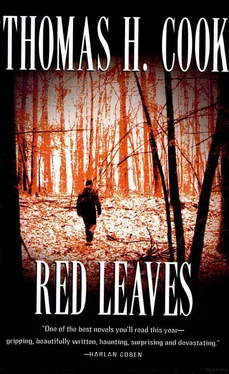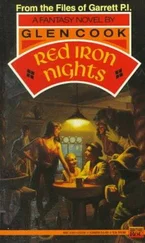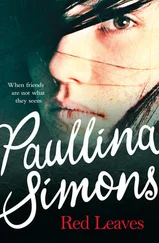But now I know, and within only a few minutes it is in my hands, buried among other papers, but not deeply. Like a body hurriedly covered with leaves and fallen branches, the lightest digging brings it up, not a policy exactly, but a letter to my father, informing him that the life insurance policy on his wife has been approved in the amount of two hundred thousand dollars.
"Eric?"
I looked up and saw Meredith standing at the bottom of the stairs. I hadn't heard her come down them, the soft tread of her feet muffled by the stormy currents in my own mind.
"What are you doing down here?" she asked in a voice that seemed faintly alarmed, like she'd stumbled upon some oddity in me that called other, once-stable, characteristics into question.
"Just going through some old stuff," I answered.
She peered at the pile of papers that lay strewn across the desk. "What are you looking for?"
I quickly glanced down and noticed a photograph. "This," I said, lifting it from the pile for her to see.
It was a family photograph, the last one taken of all of us together. My father and mother on the front steps of the big house, their three children lined up in front of them, Warren on the left, Jenny on the right, me in the middle.
Who had I been then? I wondered as I glanced at the picture. How much had I known that year? How much had I refused to know? And not just about hidden things, the insurance policy, my mother's grief, but about the most obvious aspects of life in the big house. Had I once considered how cruelly Warren was treated or that Jenny sometimes had headaches and fell for no reason at all, or that my mother often sat silently at the kitchen table, toying distractedly with a crushed napkin? Had I once glanced out the window of the fancy bus that whisked me to Saint Regis each morning, looked out as the big house grew small in the distance, and allowed myself to confront the possibility that something might be wrong?
I looked at my wife, noted the wariness in her gaze, and Leo Brocks words sounded in my mind, the disturbing intimation that all was not well in my own house, either, and that someone out there knew it.
Something wrong.
For a moment, I imagined the source of that discomforting remark, saw a phantom person pawing through my papers as I'd just pawed through my fathers, full of suspicion but with no real evidence. I suddenly felt an annihilating fury at whomever it was who'd phoned the police hotline, a rage that was not in the least calmed by the fact that I could not even be sure that there was such a person. And yet I believed that there was, believed it so powerfully that I instantly imagined the caller's voice as something between a lascivious whisper and the hissing of a snake. The caller's profile emerged no less fully formed—a fat puffy face, with thick moist lips and a day's growth of facial hair. I could even see the outline of his room, dirty and disheveled, littered with grease-stained paper napkins and empty pizza boxes. He was a bachelor, this man, lonely and hateful, someone who'd seen either me or Meredith or Keith and fixed some sullen and resentful part of himself upon us. He had created histories for us, I decided, and ran those histories through his mind, sneering at a family whose imagined perfection he despised.
"You don't want me to see it?"
I came out of my reverie to find Meredith now at the desk, tugging at a picture I had reflexively resisted letting go.
"Of course, you can see it," I said. I released the photograph and watched as Meredith gazed at it expressionlessly.
"Why were you looking for this particular picture?" Meredith asked.
I shrugged. "I don't know," I said. "Maybe because it was the last time everything seemed"—the final word cracked something deep within me—"right."
She handed the picture back to me. "Are you going to stay down here all night?"
I shook my head. "No," I told her. "Just a little longer."
She turned and headed back up the stairs, head bent forward slightly, her hair dangling in dark waves on the side of her face. At the top of the stairs, she stopped and stood on the landing. For a moment, I thought she might come back down to me, take a deep breath and—
Confess?
I stared at her, stunned by the word that had suddenly popped into my mind. What had Meredith done that required confession? And yet, there it was, the idea thrown up from some murky depth inside me, suspicion now flowing into empty space, filling it with a sharp, acrid smoke, so that I felt trapped in a furiously overheated room, flames licking at me from all directions, with no way to douse the ever-rising fire.
EIGHTEEN
Monday morning I got up early, walked to the kitchen and made coffee. For a long time I sat alone at the small oval table that overlooked the front yard. I recalled the previous night's search through my father's papers, the incriminating documents I'd found among them, and felt again a searing need to get to the bottom of what, if anything, had actually happened to my mother. At the same time I knew nowhere to go with what I'd found. I recalled how Meredith had come down to the basement, the strange accusation my mind had seized upon, the licking flames that had suddenly sprung up all around me, which I now laid at the feet of the undeniable strain I'd been under since Amy Giordano's disappearance. It was this tension that had created the false fires I felt still burning in me, I decided, fires which, when the mystery of her circumstances was finally resolved, would surely weaken and gutter out.
Keith came down the stairs at just past seven. He didn't bother to come into the kitchen. He'd never been hungry in the morning, and neither Meredith nor I any longer insisted that he eat something before going to school. And so on this particular morning, like most others, he simply swept down the stairs and out the door to where his bike lay on its side in the dewy grass, mounted it, and peddled away.
He'd already disappeared up the hill when Meredith came into the kitchen. Normally by this time she would be fully dressed for work, so it surprised me that she was still in her housecoat, the belt drawn tight, her feet bare, hair in disarray. She hadn't put on the usual light coat of makeup either, and I noticed dark circles under her eyes. She looked tense and un-rested, worn down by what we'd been going through.
"I'm not going in to work today," she said. She poured a cup of coffee, but instead of joining me at the table, walked to the window and stared out into the yard.
Her back was to me, and I admired her shape, the way she'd so carefully maintained it. She had broad shoulders, and long sleek legs, and despite her drawn appearance, I knew why men still turned when she came into the room.
"Keith's already gone," I told her.
"Yeah, I saw him out the window." She took a sip of coffee and kept her eyes fixed on the front yard. "I'll just call it a personal day," she said. "They don't ask questions when you take a personal day."
I walked over to her, wrapped my arms loosely around her shoulders. "Maybe I'll take off, too. Go to a movie or something. Spend the whole day. Just the two of us."
She shook her head and pulled out of my arms. "No, I have to work. It's not that kind of personal day."
"What work?" I asked.
"I need to write a lecture. On Browning."
"I thought you'd written all your lectures. Wasn't that what all those late nights at the library were about?"
She returned to the coffee machine. "All but Browning," she said. "I have the notes here."
"Any chance of finishing it by afternoon? We could go for a long walk together."
"No, I won't be finished by then," she answered. She came over to me and pressed an open palm against the side of my face. "But I'll cook a nice dinner. French. With candles. Wine." She smiled thinly. "We might even persuade Keith to join us."
Читать дальше












